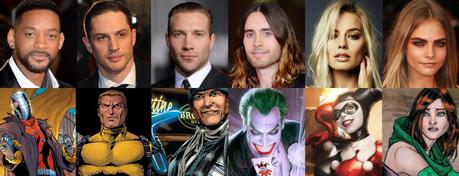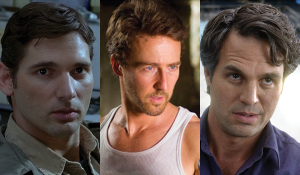There is a funny little thing actors sometimes have to do that I call the “Please like me again!” press tour. It’s that “No, seriously, this time’s it’s different” dance they have to do when they’re out promoting a new movie after their last movie bombed. It is the ultimate game of a slightly humbled millionaire looking up at us with Puss N’ Butts cat eyes and declaring, “Can you really stay mad at little ol’ me?” It can seem absolutely genuine, like how George Clooney apologized profusely for his 1997 film Batman & Robin while out promoting his 1998 film Out of Sight. It can also have as much to do with off-the-screen controversies, such as when Tom Cruise had to rehab his career by finally shutting up about Scientology and proving he could laugh at himself, donning a fatsuit for Tropic Thunder and dancing for us like a trained monkey over the closing credits.
 Lately, it’s been Will Smith’s turn. He’s had financial failures before, with a really bad three-year run at the start of the new century, 1999’s Wild Wild West, 2000’s The Legend of Baggar Vance, and 2001’s Ali, only one of which even managed to eclipse its production budget (Wild Wild West grossed $222m worldwide against a $170m budget). However, Ali did yield him an Academy Award nomination for Best Actor, and the following three years delivered successive box office hits: Men in Black 2, Bad Boys 2, and I, Robot. So, he bounced back then, and he is now looking to rebound after the embarrassing failure of 2013’s laughably bad After Earth. That movie didn’t just underperform ($60m domestic/$243m worldwide against a $130m budget); it underperformed so significantly that it was still being discussed months after its release as evidence for why the studio which made it – Sony Pictures – needed a complete overhaul of its leadership. That’s because Sony also made White House Down, another one of 2013’s colossal bombs, meaning After Earth’s performance was magnified.
Lately, it’s been Will Smith’s turn. He’s had financial failures before, with a really bad three-year run at the start of the new century, 1999’s Wild Wild West, 2000’s The Legend of Baggar Vance, and 2001’s Ali, only one of which even managed to eclipse its production budget (Wild Wild West grossed $222m worldwide against a $170m budget). However, Ali did yield him an Academy Award nomination for Best Actor, and the following three years delivered successive box office hits: Men in Black 2, Bad Boys 2, and I, Robot. So, he bounced back then, and he is now looking to rebound after the embarrassing failure of 2013’s laughably bad After Earth. That movie didn’t just underperform ($60m domestic/$243m worldwide against a $130m budget); it underperformed so significantly that it was still being discussed months after its release as evidence for why the studio which made it – Sony Pictures – needed a complete overhaul of its leadership. That’s because Sony also made White House Down, another one of 2013’s colossal bombs, meaning After Earth’s performance was magnified.
While out promoting his new film, Focus, Smith has struck a self-reflective chord, admitting, “After the failure of After Earth, a thing got broken in my mind,” meaning it caused him to re-evaluate his self-made identity as the guy who puts out big movies in the summer, dating back to 1996’s Independence Day. He’s taking a different approaching going forward, describing how when he went into Focus he “completely released the concept of goal orientation and got into path orientation. This moment. This second. These people. This interaction.”

I should note that After Earth is really more Jaden Smith’s movie than Will Smith’s, in terms of screen time
That’s not so much “Please like me again!” as it is “I don’t care if you like me anymore, but now that I’m not trying so hard I’ll be so effortlessly entertaining you’ll come back to see me.” Maybe not. Focus mustered a mere $18.6 million domestic debut this weekend, the lowest inflation-adjusted opening of Smith’s career since 1993’s Six Degrees of Separation, aka, one of his first movies. However, Smith’s new “I’m just trying to have fun making movies” approach likely brings with it an altered set of box office expectations. Focus, after all, cost just $50 million to make, something which Warner Bros. executive vp of distribution Jeff Goldstein was quick to point out, “This was a midrange-budgeted movie, and the strong result reflected that.” Of course, he was also quick to blame the” severely inclement weather in the Midwest and the South,” and it could be argued that Smith’s star power is such that the entirety of this opening is due to his appeal. His co-star Margot Robbie is a smoking hot blonde, or at least that’s all the trailers really tell you about her, with maybe a scant reference to how she was in Wolf of Wall Street. The plot is suitably twisty and turn-y for a con movie, thus making it kind of hard to explain in ads. So, this was a classic case of “Star + Concept” with more of an emphasis on “Star.” It’s not going to be a smash hit, but after this debut Focus is highly likely to turn a modest profit at the worldwide box office.
The real test of Smith’s star appeal will be this Christmas’ potential awards contender and aptly-titled Concussion about the National Football League’s concussion controversy, and 2016’s Suicide Squad, Warner Bros.’ adaptation of the DC “super-villains forced to go on black-ops missions by shady government operatives” comic book.

Smith’s done a superhero movie before, Hancock, but that was an original property created for the screen and his star power helped it make over $600 million worldwide.
It’s more than a little weird that Will Smith is even in Suicide Squad, though. It’s not weird that he’s the male lead, and that rumors almost instantly popped up about him demanding re-writes to give his character more screen time, which is the type of rumor that has followed him throughout his career, as far as back as Fresh Prince of Bel Air. What’s weird is that one of the biggest movie stars in the world is doing a comic book movie. People you’ve never heard of before like Chris Hemsworth or Henry Cavill or people on the downside of their career like Robert Downey, Jr. or people who are known but have never anchored their own really big box office hit like Paul Rudd or Benedict Cumberbatch do comic book movies. A movie star like Will Smith is supposed to be the last of a dying breed of Denzel Washington-like actors whose name alone can guarantee a comfortable return on investment. These are the guys who make life easier for marketing departments, putting together movie posters which merely need to have two words on it: the star’s last name and the title. Denzel: The Equalizer. Smith: I, Robot. However, this is the age of the brand (Marvel Studios) and comic book movie, sold as “Come see this character you like!” not “Come see this actor you like playing this cool character.” Suicide Squad is going to have it both ways, pitching us “Come see Will Smith in a comic book movie” as well as come see “Harley Quinn played by that sexy blonde from Focus and Wolf of Wall Street” and “The Joker played by the Jesus-looking dude from Dallas Buyer’s Club.”

The original cast of the Suicide Squad; Tom Hardy (second from the left) has since dropped out
Really, putting Will Smith into Suicide Squad is an old-school move made by a risk-averse studio which wants some kind of box office insurance for the gamble they’re taking, like how Gene Hackman and Jack Nicholson were brought in to prop up Superman and Batman. The same can be said for casting Ben Affleck as Batman, picking him up after his comeback was seemingly complete with The Town and Argo. However, those are the exceptions in the current film economy. More often than not, it is not the actor who carries the franchise but instead the franchise that carries the actor. As the New York Times explained last year:
The six major studios are releasing about 30 percent fewer movies than they did seven years ago, and they have largely narrowed their focus to expensive concept projects or franchises based on existing intellectual property — comic books, young-adult novels, older movies — that can be rebooted and sold to passionate pre-existing audiences around the world. Because the American movie market now makes up less than a third of global box-office receipts, studios tend to favor projects featuring explosions, car chases and doomsday scenarios — a universal language of violence that translates easily in China, India, Brazil and Europe.
This has crippled the once-thriving star system which saw actors commanding $20 million in up front salaries plus 15-20% of the gross profits. The highest paid stars of that old system were Arnold Schwarzenegger, Tom Cruise, Sylvester Stallone, Mel Gibson, Eddie Murphy, Kevin Costner, Harrison Ford, Robin Williams, Jim Carrey, Demi Moore, and Julia Roberts. Their name alone could open a movie, and they were very aware of that. So, they often demanded total control over just about everything, granted final approval on the script, director, casting, usage of images for publicity, where their name would fall in the credits in relation to the other star. They often even got final-cut approval. That’s on top of the many, many bonuses, such as restrictions on film scheduling, studio-paid personal and entourage jet travel, personal gyms, 24/7 trainers/nutritionists, etc. If you wanted Jack Nicholson you knew that it was going to be a nightmare if you filmed during the NBA season because he would not film on the nights when there was an LA Laker’s home game to attend. If you wanted Harrison Ford, Kevin Costner, Tom Cruise, Demi Moore, or Julia Roberts you knew you had to give them private jets, often more than one to accommodate overflow members of their entourage.

Julia Roberts in Mary Reilly, for which she demanded a private jet to escort her from the Pinewoods Studio set in London back to her LA home every weekend for all 3 months of filming
It worked because business was booming, with year-to-year box office going up every year from 1993 to 2004, and it’s not like the studios were models of fiscal responsibility. At one point, the co-head of Columbia Pictures gave not just his girlfriend a cushy, high-level production job despite a complete lack of qualification; he also put the girlfriend’s young daughter on salary. Of course, that guy lost his job when his many bad decisions ran the studio into the ground, and the stars lost their pampered lives when the studios realized that it made no sense to pay Julia Roberts $10 million to be in Mary Reilly when Mary Reilly only ended up making $12 million worldwide. Time and time again throughout the decade into the new millennium the stars and their exorbitant salaries/demands faltered while an unproven action star like Keanu Reeves and an unknown like Sandra Bullock could turn 1994’s Speed into a phenomenon, a collection of also-rans and Jeff Goldblum helped Fox practically print money with 1996’s Independence Day, a special effect was the real star over the likes of Helen Hunt and Bill Paxton in 96’s wildly successful Twister, and two unknowns turned 1997’s Titanic into the biggest film of all time.
Of course, surprise hits like those are the things that create movie stars, with Sandra Bullock and Leonardo DiCaprio emerging from that particular run of blockbusters and persisting into today as two of the highest-paid actors around. Will Smith wasn’t getting paid crazy amounts of money for Independence Day or Men In Black (1997), but by the time Men in Black 2 (2002) came around he demanded $20 million plus 20% of the profits. He could ask for that because he had been able to grow his stardom over those first two big hits. That’s just how that type of thing generally goes in all walks of business life. You have to start somewhere, and as you become more successful you get paid more.
 And then Lord of the Rings happened. And Harry Potter happened. And The Dark Knight and Iron Man happened. And then Marvel Studios realized it could simply replace Eric Bana as the Hulk with Edward Norton and no one would mind. And then Terrance Howard asked for more money to be in Iron Man 2, and they dropped him like a bad habit, replacing him with Don Cheadle, again proven correct that no one would ultimately care about the change. They did it again with Mark Ruffalo in The Avengers, and now they’re tossing Andrew Garfield aside to create a brand-new Spider-Man with an all-new continuity, set to premiere just two years after the last Spider-Man which was itself a reboot of the Tobe Maguire Spider-Man which had only been dead for 4 years. The film star has become replaceable, and the cost of doing business for up-and-comers is to work for cheap in exchange for huge global exposure and a kickstart on your career. You parlay that exposure into film stardom.
And then Lord of the Rings happened. And Harry Potter happened. And The Dark Knight and Iron Man happened. And then Marvel Studios realized it could simply replace Eric Bana as the Hulk with Edward Norton and no one would mind. And then Terrance Howard asked for more money to be in Iron Man 2, and they dropped him like a bad habit, replacing him with Don Cheadle, again proven correct that no one would ultimately care about the change. They did it again with Mark Ruffalo in The Avengers, and now they’re tossing Andrew Garfield aside to create a brand-new Spider-Man with an all-new continuity, set to premiere just two years after the last Spider-Man which was itself a reboot of the Tobe Maguire Spider-Man which had only been dead for 4 years. The film star has become replaceable, and the cost of doing business for up-and-comers is to work for cheap in exchange for huge global exposure and a kickstart on your career. You parlay that exposure into film stardom.
This isn’t really working out the way it used to. Chris Hemsworth isn’t a star because he’s Thor. Since playing that role, he has two box office bombs, one actually well-liked (Rush), the other not (Blackhat). Chris Evans’ most notable film outside of Captain America, Snowpiercer, was mostly a VOD-release. Our new Captain Kirk, Chris Pine, failed in his second effort to re-launch a franchise, Jack Ryan: Shadow Recruit, and his rom-com with Reese Witherspoon, This Means War, did just okay, not great. Even Robert Downey, Jr.’s appeal has limits, as although he was briefly holding down two franchises, Iron Man and Sherlock Holmes, he’s now struggling to open an awards contender he actually produced with his wife, The Judge. Of course, he’s already won because he proved so indispensible to the Marvel Cinematic Universe they had to pay up, giving him $50 million for The Avengers and probably so much for any future appearances that they just resorted to backing up trash trucks filled with cash into his driveway.
 To some degree, the old star system does survive in the sense that certain actors still hold immense and unwavering international appeal just as certain lower-tier actors have enough name recognition that their presence in a cast helps secure funding for an indie film. That’s how you have people like Edward Norton, Emma Stone, Naomi Watts, and Michael Keaton all working for scale on the independently produced Birdman. However, with such a radical shift over the past couple of decades from star-driven vehicles to brand/intellectual property-driven vehicles there is a sense that as we watch one of the last great film stars like Will Smith start to falter there may not be anyone groomed to replace him, at least not one who will emulate his success because that was a success achieved in a very different era. If you look at The Hollywood Reporter’s list of the highest-paid actors in Hollywood not a single one of them (e.g., Angelina Jolie, Dwayne Johnson, Denzel Washington, Leonardo DiCaprio, Liam Neeson, Mark Wahlberg) is new and seemingly half of them make their money from endorsement deals (George Clooney, Charlize Theron, Brad Pitt, Catherine Zeta-Jones).
To some degree, the old star system does survive in the sense that certain actors still hold immense and unwavering international appeal just as certain lower-tier actors have enough name recognition that their presence in a cast helps secure funding for an indie film. That’s how you have people like Edward Norton, Emma Stone, Naomi Watts, and Michael Keaton all working for scale on the independently produced Birdman. However, with such a radical shift over the past couple of decades from star-driven vehicles to brand/intellectual property-driven vehicles there is a sense that as we watch one of the last great film stars like Will Smith start to falter there may not be anyone groomed to replace him, at least not one who will emulate his success because that was a success achieved in a very different era. If you look at The Hollywood Reporter’s list of the highest-paid actors in Hollywood not a single one of them (e.g., Angelina Jolie, Dwayne Johnson, Denzel Washington, Leonardo DiCaprio, Liam Neeson, Mark Wahlberg) is new and seemingly half of them make their money from endorsement deals (George Clooney, Charlize Theron, Brad Pitt, Catherine Zeta-Jones).

Will Smith hasn’t dug himself a Johnny Depp-sized hole yet
There was once a point in film history where the studios practically owned the actors. Then the federal government put a stop to that. Then there was a period, after much uncertainty, where the actors had all the leverage. That naturally grew to such a level of excess that the studios looked for ways to wrestle back control, and the era of the “property as star” was the answer to all their prayers while also being a film star’s nightmare. Now, a recent failure has a former giant like Will Smith re-evaluating the meaning of success, pledging to be more present and enjoy the films he makes rather than sweating the opening weekend numbers. That’s certainly a healthier mindset, signaling that maybe he’s recommitted to trying to make the best movie possible every time out, simply taking them one at a time. He no longer has to own the July 4th weekend, as he once boasted. However, he used to be a star we’d all go to see almost every time he made a movie. If you make enough bad movies or merely okay ones that kind of thing is going to change. Someone new will take your place. These days, that new guy might not be coming, not the way it used to happen.
That’s not necessarily a bad thing. Slavish devotion to a star leads to you eventually seeing some pretty crappy movies, and in the current system new or emerging stars like Jennifer Lawrence, Melissa McCarthy, and Shailene Woodley seem to experiment more with the type of films they want to make, McCarthy going surprisingly dark with Tammy or sweet and sincere in St. Vincent, Woodley doing an indie no one really sees like White Bird in a Blizzard, etc. Kristen Stewart has gone out of her way to choose challenging films post-Twilight, beyond Snow White & The Huntsman, and Daniel Radcliffe hops from genre (horror? The Woman in Black) to genre (rom-com? What If) to genre (black comedy? Horns). That’s probably more interesting than an age when we watched Will Smith follow-up Independence Day and Men in Black with Wild Wild West.
This Weekend’s Actual Box Office Top 10 Totals (2/27-3/1)
1. Focus (Opening Weekend)
- Production Budget=$50m
- Weekend Gross (Domestic)=$18.6m
- Weekend Gross (International)=$12.2m
- Worldwide Debut=$30.8m
2. Kingsman: The Secret Service

- Production Budget=$81m
- Weekend Gross (Domestic)=$11.8m
- Weekend Gross (International)=$25.8m
- Current Domestic/International/Worldwide Total=$85.7m/$124.6m/$210.3m
Comic book movies generally cost $175-200m to produce, but there is a lower tier that kind of flies by unnoticed like the Ghost Rider films, Constantine, and Kick-Ass 1 and 2, costing no more than $100m and no less than $30m to make. As a result, there isn’t much really to compare Kingsman to beyond Ghost Rider 2 which cost $57m to make and also came out over President’s Day, back in 2012. It failed to make much of an impression, scoring $51m domestic and $132m worldwide. Even after you adjust for inflation, Kingsman has well eclipsed both of those totals.
3. SpongeBob Movie
- Production Budget=$74m
- Weekend Gross (Domestic)=$10.8m
- Weekend Gross (International)=$14.2m
- Current Domestic/International/Worldwide Total=$139.9m/$96.3m/$236.2m
4. 50 Shades of Grey

- Production Budget=$40m
- Weekend Gross (Domestic)=$10.5m
- Weekend Gross (International)=$36m
- Current Domestic/International/Worldwide Total=$147.3m/$338.4m/$485.7m
After its near 74% drop last weekend, 50 Shades dropped another 51% this weekend. Forbes argued, “In today’s marketplace, the drop is more about having met the majority of the demand as opposed to outright rejection of the product.” That being said, the rate at which this film is dropping is worst than most, such as the rather comparable Fault in Our Stars, indicating the drop at least has a little bit to do with quality.
5. The Lazarus Effect (Opening Weekend)

- Production Budget=$3.3m
- Weekend Gross (Domestic)=$10.2m
- Weekend Gross (International)=Nothing
- Worldwide Debut=$10.2m
The Blumhouse model is to make genre movies for $5 million or less, and then spend the $20 million or $30 million needed to release them in theaters only if they have a shot at selling at least $25 million worth of tickets. It is a deal keyed off of the insane profitability Jason Blum has enjoyed with the Paranormal Activity franchise, and it is a high-risk, high-reward proposition whereby noted directors and actors and crew members will work for next to nothing in exchange for profit participation. The problem is if the movie never comes out those people are left totally screwed, and Universal currently has a stack of completed Blumhouse films it doesn’t know what to do with. The Lazarus Effect, which is commonly regarded as The Flatliners rip-off that then turns into a Pet Semetary rip-off halfway through, stars notables like Olivia Wilde, Donald Glover, Mark Duplass, and Evan Peters (Quicksilver from Days of Future Past). Relativity Media bought it off of Lionsgate for just over $3m. The beauty in the model is that they’ve already tripled their production budget after 3 days. However, considering that Lazarus was granted a rather damning C- CinemaScore by opening night audiences big drop-offs in the coming weeks are likely making it possible that they’ll struggle to reach that $25m threshold.
6. McFarland, USA
- Production Budget=$25m
- Weekend Gross (Domestic)=$7.8m
- Weekend Gross (International)=Nothing
- Current Domestic Total=$22m
7. American Sniper
- Production Budget=$60m
- Weekend Gross (Domestic)=$7.3m
- Weekend Gross (International)=$19.5m
- Current Domestic/International/Worldwide Total=$330.8m/$139.1m/$469.9m
8. The DUFF

- Production Budget=$8.5m
- Weekend Gross (Domestic)=$6.8m
- Weekend Gross (International)=Nothing
- Current Domestic Total=$19.7m
Adapted from a novel written by an actual high school senior, The DUFF is the first real high school comedy to make any noise at the box office since 21 Jump Street ($138m domestic) and Project X ($54m domestic) in 2012 and Easy A ($58m domestic) in 2010. It is a genre which has been on the decline. Females under the age of 25 (comprising 68% of the audience) have largely been responsible for ensuring that The DUFF should manage to turn a modest profit.
9. Still Alice (Top 10 Debut)

- Production Budget=$5m
- Weekend Gross (Domestic)=$2.6m
- Weekend Gross (International)=Nothing
- Current Domestic Total=$11.9m
Unlike most of the other Academy Award contenders, Still Alice has been holding back for literally months now, slowly adding new theaters before expanding wide the weekend of the Oscars and then adding nearly 600 more theaters this weekend. That’s the type of strategy you can utilize when pretty much everyone knew Julianne Moore was going to win Best Actress thus guaranteeing that you’re wide expansion would coincide with a win instead of a loss.
10. Hot Tub Time Machine 2
- Production Budget=$14m
- Weekend Gross (Domestic)=$2.4m
- Weekend Gross (International)=Nothing
- Current Domestic Total=$10.2m
What Left the Top 10?: Paddington (Current total: $70.1m domestic/$55m budget), Jupiter Ascending (Current total: $43.1m domestic/$176m budget) & The Imitation Game (Current total: $86.8m domestic/$14m budget)
What’s Up Next?: Chappie (Robot movie from the guy who made District 9 and Elysium), The Second Best Exotic Marigold Hotel (whose title is tailor-made for reviews declaring this sequel to be inferior to its predecessor) & Unfinished Business (Dave Franco/Vince Vaughn comedy which feels like it’s not getting much of a marketing push)

